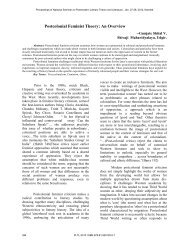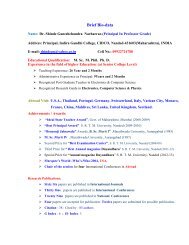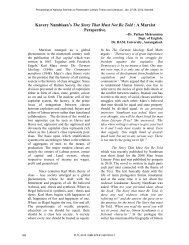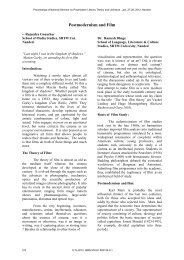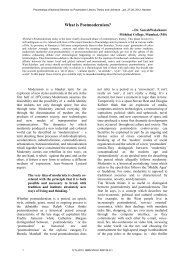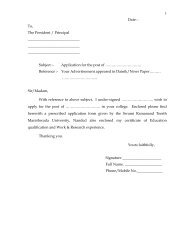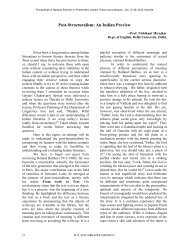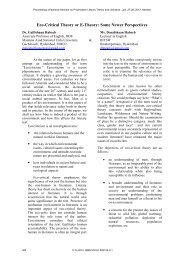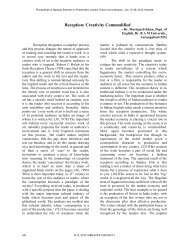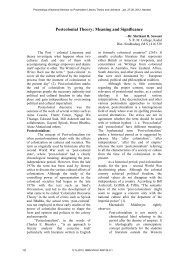Multiculturalism - Igcollege.org
Multiculturalism - Igcollege.org
Multiculturalism - Igcollege.org
You also want an ePaper? Increase the reach of your titles
YUMPU automatically turns print PDFs into web optimized ePapers that Google loves.
Proceedings of National Seminar on Postmodern Literary Theory and Literature , Jan. 27-28, 2012, NandedCollectivism endorses the idea that theindividual has no free will. <strong>Multiculturalism</strong> is aversion of collective. This encompasses one’sculture-culture of components like one’s skincolour or sex and clothing, food, geography,language, philosophy and religion. Thefundamental area is that one’s actions andbehaviour are dictated by one’s blood. Thesecond component is Egalitarianism which isthe idea that all units of the society must equallyin all respects. According to multiculturalism,the primary unit of society is the group. It holdstherefore, that all groups are to be treatedequally in all respects. Thus, multiculturalism isagainst all kinds of discrimination. The lastcomponent is Diversity which is loggerheadswith its concept of Egalitarianism. We can thussay that multiculturalism is reduced to theperpetual level where all groups are to be treatedequally on the basis of skin colour, sex-ratherthan conceptual i.e. ideas and values.Mulk Raj Anand, the novelist of greatrepute and short story and art critic writer inEnglish, was born at Peshawar on December 12,1905. He came from a family, which wasslightly superior to the untouchables. His fatherwas a coppersmith by birth and later joined theBritish-Indian army; his mother was an illiteratepeasant woman from Central Punjab.Ananddrew a realistic and sympathetic portrait of thepoor of his country. The culture and ethos of anycountry is mirrored in its literature.Expressinngvarious cultures of a country in an alienlanguage is indeed a very challenging task whichIndian authors in English have endeavoured toperform. Mulk Raj Anand is a name related tomodernizing the Indian novel and stories. I shalltry to analysis the multicultural aspects in a fewselected works of Mulk Raj Anand.With RajaRao and R.K. Narayan he has been regarded asone of the "founding fathers" of the IndianEnglish novel.And he had soon become possessed withan overwhelming desire to live their life.He had been told they were sahibs,superior people. He had felt that to puton their clothes made one sahib too. Sohe tried to copy them as well as he couldin the exigencies of his peculiarly Indiancircumstances. (From Untouchable,1935)Besides being a novelist, Mulk RajAnand is also a short story writer of great repute.His short stories are full of pathos and saga ofhuman sufferings. He not only deals with thesufferings of the destitute and the downtroddenbut he also depicts the psychological behavior ofadolescents, and the deep feelings of the delicatewomen. His short stories are the treasure houseof genuine feelings, unimaginable humansufferings, empathy and understanding of humanlife against the Indian socio-economic andcultural background. The following short story‘The Tractor and the Corn Goddess’ is anattention-grabbing story in which one comesacross the authentic picture of the superstitioussociety in the contemporary time. Nawab Sahibis the chief of the village. Abdul Hamid, theengineer and a proponent of the moderndevelopment in the village. Chhaju, DhunniBhagat, Phagu, Shambhu Nath, Tirath are thepeasant class or working class characters in thevillage. Abdul Hamid has brought the tractor forthe fast cultivation of the land. But the villagersassumed that tractor would rape their motherland and corn Goddess. Uncle Chhaju a leaderand other peasants thought that the tractor hasmagic power and is like a ghost which is sign ofinauspiciousness. Therefore, opposed it initiallythe tractor because it will snatch the jobs of thevillagers and the axe of the unemployment willappear in their life. Lastly they convinced by theNawab and the villagers admitted the tractor isnot a curse but bless for them.This story is about the gap between twogenerations one is Hindu and another is Muslim;Muslim generation is looking forward positivelyfor better development in future and is preparedto adjust to the changing scenario of the world.But, the other segment of the society sticks tothe conventional values and is not ready tochange its life style to accommodate or face newchallenges. The assumption of the conventionalsegment of society is that;The invention is the devil and religion andtradition is in danger’(The Tractor and thecorn goddess’ p.41)495 PLTL-2012: ISBN 978-81-920120-0-1



